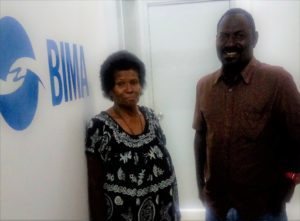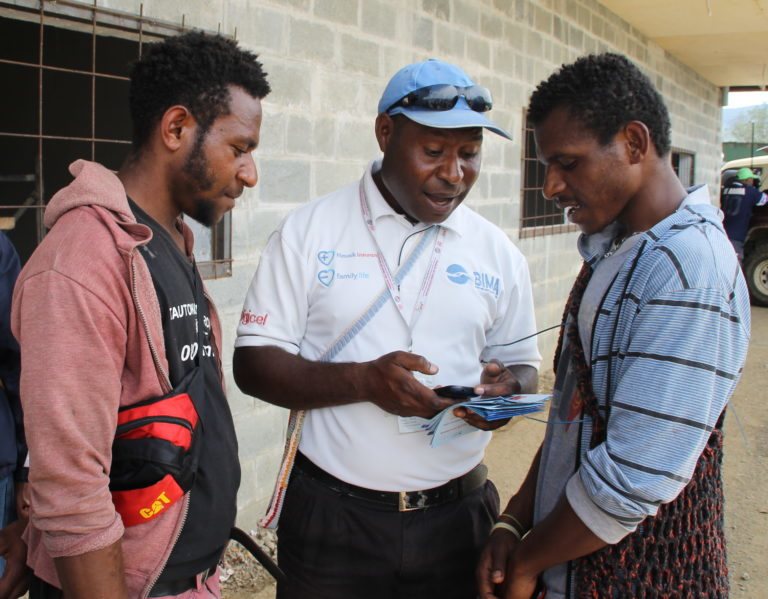Mobile Microinsurance Reaching Underserved Papua New Guineans
Tags
When Cindy Varvarum’s husband became ill last year, his frequent and expensive hospital visits drained most of the retired couple’s life savings.
“My late husband, who used to be a heavy equipment fitter in Milne Bay Province in Papua New Guinea, had suddenly fallen ill, diagnosed with a rare cardiac disease. As his health deteriorated, we became financially stressed and there were many times when I did not know how we would be able to afford his continued hospital treatment,” she said.
“Prior to his health issues, we both led healthy, comfortable, debt free lives in our early retirement at ages 58 (for me) and for my husband at 57 years old. I never dreamt that we would be faced with such a worrying situation, which I am still coming to terms with,” she added.
When her husband succumbed to his illness in June 2017, with all their finances exhausted, emotionally and physically drained, Mrs Varvarum was faced with the burden of finding money to pay for traditional funeral costs.
“It was during this time of despair that I remembered my late husband’s insurance policy with BIMA Insurance. I recalled that about two years ago, he had received an SMS message from Digicel about his BIMA ‘FamilyLife’ insurance coverage.
“I decided to check with BIMA on my husband’s insurance. I learnt that I was his beneficiary and that I would be paid K4,000 (USD $1,246),” she added.

Cindy Varum at the BIMA Office in Papua New Guinea. ©BIMA
Mrs Varvarum received the money in her bank account within a month and used some of it to repay part of the expenses incurred for her husband’s funeral. She says the remainder of the money will help her to return to her village.
“When Peter signed up for his policy, we didn’t think much of it. We really did not see the significance and importance of insurance. It was the affordability of it that attracted him to signing up for the cover.”
“We were amazed by how cheap the insurance was and how easy it was to buy it. He only had to pay K3.60 (USD $1.13) a month which was deducted automatically from his Digicel talk time credit,” said Mrs Varvarum.
The widow and mother of three is encouraging more Papuans to think seriously about insurance and its benefits and talks of the peace of mind and financial security that it can bring.
“In truth, we were not financially prepared for such a time like this. If you can afford it, please get insurance, because you never know when you may suffer an unexpected event like illness or death,” she said.
BIMA ‘FamilyLife’ Insurance is a revolutionary mobile microinsurance offered in Papua New Guinea by BIMA using the Digicel platform and underwritten by Capital Life Insurance Company. Under this cover, the policy holder can insure his/her life and nominate a person to be the beneficiary to receive the payout if a claim occurs. Besides death, the insurance also covers Total Permanent Disability such as blindness or paralysis.
BIMA uses innovative technology to deliver affordable life and hospitalisation insurance cover via mobile phones to low-income, financially underserved Papua New Guineans. BIMA’s insurance products are cheaper and easier to use than traditional insurance, making them appealing to low-income customers.
In Papua New Guinea (PNG), BIMA sold a cumulative total of almost half a million life and hospitalisation insurance policies and has almost 300,000 unique clients since launching in 2015. Most customers have never had insurance or any form of formal financial services before.
Through European Union funding, the Pacific Financial Inclusion Programme (PFIP) helped BIMA grow its operations by setting up an office in Mount Hagen. In less than two years since beginning operations in PNG, BIMA had significantly surpassed its initial target of reaching 76,542 highlanders and has become one of PFIP’s most successful partners to date. Close to 800,000 policies were sold throughout the project through 120 agents (45% women).

A BIMA Agent speaking with potential customers in Mt Hagen, PNG ©Erica Lee
PFIP is a Pacific-wide programme that has helped more than two million low-income Pacific islanders gain access to formal financial services and financial education. It does so by funding innovative approaches in development of financial services, supporting policy and regulatory initiatives, and empowering consumers. PFIP is jointly administered by the United Nations Capital Development Fund (UNCDF) and the United Nations Development Programme (UNDP) and receives funding from the Governments of Australia and New Zealand and the European Union.